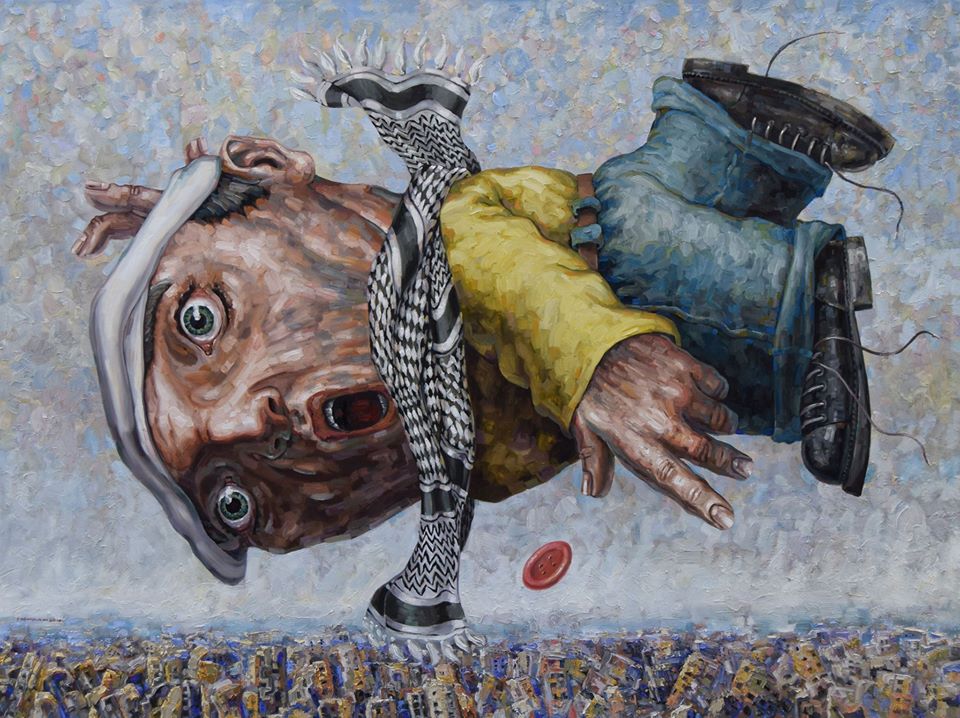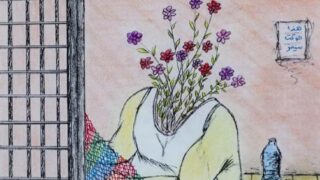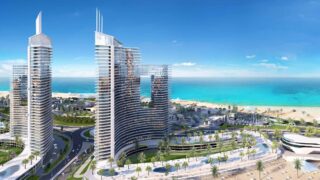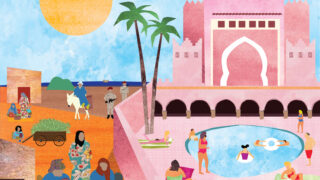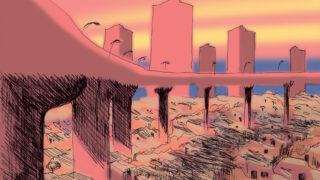
This publication has benefited from the support of the Rosa Luxemburg Foundation. This text may be reproduced in part or in full, provided the source is acknowledged.
Informal economy is one of the most widely discussed issues in Egypt’s academic and political spheres. This economy is so divergently widespread that it touches almost every aspect of life. The Left and the Right in the country are both interested in applying their own reasoning regarding the causes of the issue and its possible solutions. After the 2011 revolution, informal economy became a central issue in its relation to feminism in Egypt, especially as it was linked to the subsequent security threats, the violence inflicted on women, and the high rates of sexual harassment. Evidently, it is a recurrent and important question in terms of feminist thought, since it has always been associated with the marginalization of the role of women placing them under the heaviest of burdens. Women, far from being granted their basic legal rights in the public sphere in Egypt, are also completely deprived from their rights in the informal sector. That is unless they are somehow partly granted some of their rights by virtue of the “benevolence” of patriarchal elders who wish to “guard their honor”.
The informal economy is part of a complicated equation in Egypt. It is the product of the collapse in the economic and developmental structures, but it has also come to act as one of the tools that reproduce this collapse: it is the cause of the problem and it is, in itself, a problem.
Informal economy is considered to be every economic activity which is not legally state-registered and which does not appear in the tax records or adhere to employment laws. However, it may be necessary to consider, in addition to this common definition, other aspects of informality, such as unregistered real estate activity, "Ghofra” (the fees paid in exchange for certain services or protection), the misuse of power in brokerage activities, and the business relations in which the formal and the informal economies overlap. This kind of ‘parallel’ economy would also include those engaged in formal and regulated economic activities in the private sector, but who are not officially registered with the relevant authorities in clear binding contracts, social security, health insurances or employment security.
Why is this very important?
To answer this question, we must first consider statistics. Informal economy accounts for about 40 percent of Egypt's economic process. Informal economic transactions in the Egyptian economy are estimated to be somewhere between 50 and 60 percent of the gross domestic product (GDP), according to Frederick Schneider estimations(1). More than 60 percent of the jobs created between 2006 and 2010 were jobs in the informal sector, according to a UNDP report on Egypt (2012). Amr Ismail, a political economist at the Carnegie Institute, points out that the informal economy cannot be considered an irregularity or a mutation of the economic system in Egypt, but that it is, in fact, the very foundation of the private sector’s activities.
The annual turnover of informal capital in Egypt is about 288 billion dollars. This figure comes from a recent study by the Federation of Egyptian Industries, which includes the market of unregistered real estate in this economy. This is an important aspect in Egypt, as most of the available opportunities for maximizing wealth lie in investing, speculating shares, or in placing money in real estate instead of banks and productive businesses, because it provides a good return and a minimal risk. For example, there are 2 million housing units registered in the “land registry”, while there are 25 million units allocated for leasing, which means only 8 percent are declared, and the rest are subject to customary unofficial contracts. The study adds that there are 45 thousand illegitimate factories and 1200 marketplaces throughout Egypt, with about 8 million unregistered employees, who have no job security or insurances. These statistics and several anthropological surveys prove that the parallel economy stretches to every aspect of life. Any given transaction in Egypt, big or mall, is destined to encounter this economy: in metro stations, popular markets, slums that rely almost entirely on informal economy, and in the spaces of contact between these slums and other areas. Informal economy is also detectable in all the different aspects of the service sector, from transportation to cleaning services, from catering and coffee shops to the real estate market and land trade, within cities and in different regions and provinces, whether they are agricultural areas or desertic lands.
Historic Roots
The term “parallel economy” was coined in the literature of social and political sciences in the end of the seventies of the past century. It was not used in Egypt prior to this period, and if used, it was linked to economic liberalism and openness (Sadat's policy since 1976). Later, in the late 1990s and with the beginning of the new millennium, the term was coined in light of several factors: the emergence of many slums throughout the country and specifically in Cairo, brutal neo-liberalism and privatization policies, growth in population and the government’s retreat from its responsibilities in the production sectors and urban planning. However, the roots of the term date back to older times, before and after the English colonization era, when it was not yet used in economic discourses or political terminologies. These implied "categories" of informal labor were mentioned in crime records, sporadically in books, or in some works of art, such as the film “The Iron Gate” by the famous director Yousef Chahine. It was used to describe the workers in the unstable agricultural sector, demolition workers, construction workers and street vendors. I exclude from this analysis the criminal activities, such as bullying for money (practiced by the “Baltagiya”, i.e. thugs and gangs), drug trafficking, and weapons or human trafficking. I do so in order to highlight the fact that parallel economy is not rooted in these activities, as it is often believed, despite them being a part of it. In reality, an organic overlap exists between the informal economy and the formal one, and contrary to popular opinion, the two worlds are not at odds.
The primitive accumulation of capital and a colonial perception of the population were common factors between the eras of English colonialism and post-colonialism. Authorities planned to maximize capital. However, they did not intend to do that by productive capital accumulation that would employ or exploit a large portion of the population in an industrial or modern service sector, but through a system that sought to accumulate primitive capital by theft and exporting raw materials, or by limited production processes. The problem here lies in the capitalist system which relies on marginalization rather than leverage.(2)
In Conclusion
• Informal economy is part of every aspect of life in Egypt, detectable even in the smallest casual transactions: in most of the popular markets, metro stations, urban slums which rely first and foremost on informal economy, and in the intersection points between the slums and other poor or wealthy areas. Informal economy is also detectable in all the different domains of the service sector, from transportation to cleaning services, from catering to coffee shops, in the real estate market and in land trade, within cities and in different regions and provinces.
• In these economic relations, the state’s only form of intervention is policing, meaning a “police governance” that aims to administer both formal and informal economic modes. This creates illegal conditions that impose a logic of negotiation and harmonization, and present these practices as the norm, in the place of the law.
• There is the question of the actual feasibility of this type of development and how it affected the lives of people in the northwestern coast which stretches 21 km northwest of the city of Alexandria all the way to the border with Libya. We are talking about over 400 km on the coast that have turned into ‘ghost towns’ all year round, except for the three months of the summer. Amid all this, there is also the practice of "Ghofra”, which are fees forcibly paid by the investors and owners of touristic resorts and land estates, in exchange for protection, and to allow the inhabitants of the region to bring in their own construction materials and other supplies.
• The emergence and progress of the parallel economy is not exclusively linked to the lack of development or low growth rates, but is also linked to the nature of development and its ability to produce job opportunities in regulated work and, hence, integrate the population in the developmental process. This did not happen in the west of Alexandria, one of the most important industrial zones in Egypt, and one of the most financially prosperous. The west of Alexandria incorporates 80 percent of all the Egyptian industries and also contains the Dekheila port.
• The Egyptian government has a long record of repeating the same series of practices. First, creating the conditions for a non-legal situation, then continually negotiating this very situation, along with the existing social and political order, and taking advantage of it as an opportunity for making accusations against certain groups, abusing them, and performing police or legal suppression.
• The shift towards neoliberalism was expected to lead to dismantling the police state and alleviating its dominance in favor of the market, as a direct consequence of the state’s diminishing control over the economy and the decreased direct intrusion in citizens’ lives. However, what happened in reality was the exact opposite. The problematic market had created much turbulence and instability which only consolidated the role of the police.
Examples in the Informal Economy
o Alexandria
To study the core of the issue rather than the margins, let us take a step back to the 1990s neo-liberalism. The west of Alexandria is one of the most important industrial zones in Egypt, where around 80 percent of the country’s industry is localized. It also contains the port of Dekheila. But, what is going on there? The majority of the population of the region falls into categories of informal employment. Their work can be divided into the following activities:
1- Labor in industrial factories
2- Taking up any kind of work in the port, providing some services like facilitating customs procedures or smuggling goods
3- "Ghofra", the fees imposed on companies and workers in exchange for protection and certain security services
4- Intermittent work in regulated and non-regulated fishing activities
5- Brokerage and provision of services and amenities
6- Providing services in recreational and seasonal tourism in the summer
Despite the great development and enormous capital invested in the region, it nevertheless suffers from severe deterioration in its infrastructure and major pollution due to the gas, oil and cement companies. One of the distinctive characteristics of the region is that the emergence and progress of a parallel economy is not linked to the absence of development or low growth rates, but is actually linked to the nature of this development and its ability to produce job opportunities in regulated work that would integrate the population in the developmental process. This did not happen in the west of Alexandria, one of the most important industrial zones and one of the most financially prosperous areas in Egypt. As a result, major conflicts on land and estates materialized among the inhabitants of the region and led to an upsurge in the phenomenon of ‘land grabbing’; the unlawful acquisition of land.
This predatory economic model overlaps with the complexity of several factors: the intersections between the formal and the informal in the economy, the relationship with the authorities, the corruption of the state’s apparatuses and police administration. Business owners have come to accept the customary practice of “Ghofra”, a form of rent based on the abuse of power and the influence of some major families in these areas. They force the owners of capital to pay them, either to cover their financial needs or for the benefit of those in power who wish to maximize their wealth and resources. Police corruption is also entangled with land grabbing operations and involved in overlooking some criminal and informal activities, with the purpose of gaining greater police influence and control through these channels. The dignitaries and family elders consolidate their power by engaging in these networks and maximizing their profits through investing in unregistered land or brokering for registered lands. All of these activities are invisible to the government’s administrative apparatus and are not subject to taxes and labor laws. Naturally, health insurance and job security are also out of the question, because this kind of work is meant to be regarded as a private family business or an individual business according to those in power. In this kind of economic relations, the state’s only form of intervention is policing, meaning a “police governance” that aims to regulate both formal and informal economic life. This creates illegal conditions that impose a logic of negotiation and harmonization, and present these practices as the norm, instead of the law. It carries a disregard for productive capital accumulation which can lead to the incorporation of more people in the work force and maximizing this capital while upgrading the laborers’ skills. This type of socio-economic dynamic requires a different set of work skills than those needed in the regulated market.
The intersections between formal and informal economies can also be detected in other aspects within Alexandria, specifically in navigation and customs control. There are major shipping lines regulated by international and Egyptian law at the same time, and there is also the port, which is another regulated area. Both sectors are undoubtedly fundamentally corrupted. Customs clearance and navigational service offices act as mediators between the exporter or the importer, on the one hand, and the shipping companies and the port, on the other hand. In this second sector, in customs and shipping, everything is done in an extremely erratic way, as the law is often ignored and the administrative regulations are often circumvented or manipulated. Most of the employees are unregistered or temporary workers whose insurance and pensions are not guaranteed, and they do not even benefit from health insurance. Most of the owners of the small-scale private companies take advantage of the surplus of labor-seekers who urgently need any form of employment. They are not willing to make long-term investments in these workers and see no need to officially register them. A miniscule number of these workers might later become officially registered, but only after many years, and only if they were associated, in some ways, with the business owners. Everyone knows this. However, the two “conflicting” formal and informal sectors still agree on certain practices within this elaborate process, such as their commitment to "policy" contracts, which represent the official international contracting between the exporter and the importer. This is why it is important to take into consideration the case of the unregistered workers in the formal sector who are part of the informal economy at the same time. Ever since the end of the seventies, these workers have represented a substantial part of the private free market in Egypt.
Marginalized Provinces
When we talk about informal economy, we usually consider a self-nurturing economy that grows in the absence of any form of developmental or financial growth. However, this economy is currently deeply intertwined with the developmental process. The parallel economy is a fundamental feature in some of Egypt’s provinces and a source of livelihood for its inhabitants. Hence, it also reshapes the nature of relations in these areas and reevaluates their geographic presence. The northern and western coasts of Egypt, 21 km northwest of Alexandria and all the way to the borders of Libya, are stark examples of this case. The analysis in this article intentionally excludes the criminal economy, despite its importance, for the systematic purpose of understanding the dynamics of interactions and the nature of the political economy of the regions in question.
The coast survives on the returns of tourism in the summer season and on the "Ghofra" (fees imposed on the investors and owners of touristic resorts and estates in exchange for protection, and to allow the inhabitants of the region to bring in construction materials and other supplies). This rentier economy finds its foundation in the annihilation and alienation of the government’s role and presence, all while integrating the local population in an extensive developmental process. Egyptian businessmen find it acceptable to boast about the experience of the northern coast, arguing that the construction of touristic villages has led to the successful recycling of the excess value that belonged to the middle and upper classes in the late 1980s and 1990s, by using this excess in recreational real estate investments. In their opinion, touristic villages have contributed to the revival of the area, which was previously nothing more than a desert land and a seacoast where tourism and recreation were very limited, localized, and unattractive to foreigners who looked for beach resorts. However, there are several questions that remain unanswered: what is the nature of the development they are promoting, how does it affect people's lives, and what is its actual feasibility? Over 400 km on the coast have turned into deserted ‘ghost towns’ all year round, except for the three months of summer when tourism flourishes. The "Ghofra” fees and the various touristic services represent the essence of the political economy in the region, in addition to the cultivation of fig trees. There are no other sources of income and no productive processes exist because of the developmental strategies of the government and the "bourgeoisie", which ignore the need to engage a large portion of the population in the economic processes.
Another issue is that the coast’s population is most often perceived in a simplistic way that lacks a nuances and complexity. Despite the constant contact between the coastline and the city of Alexandria, a stereotypic picture of the coastal population prevails as "backstabbing Arabs" who are but mere cannabis dealers who practice gangster bullying and land grabbing. Part of this picture may be true, but it is incomplete. The coast’s inhabitants are not necessarily ‘thugs’, because the “Ghofra” had always been a customary agreement between the state and the investors. Everyone silently condoned it, since there were no other sources of economic income for the inhabitants who were removed from their lands and pushed back, away from the coast. These people were excluded from the developmental process, and the police is a responsible partner in this, primarily because of their reinforcement of the stereotypic image of the Bedouin Arabs as rebellious outlaws, foreign outsiders, and later as cannabis dealers and deceitful people. Police officers, generation after generation, inherited this stereotypic perspective which generated high levels of violence and subjected the people of the region to continuous suspicion and accusation. The coast road, especially the “Dab’aa” ambush point, is known to be the site of fierce police control. Naturally, the impact of this situation on the Bedouins of the region is far greater than the impact on the passersby. Unless the Bedouin is a tribal elder or a member of one of the powerful families, he becomes subjected to constant inspection, harassment and sometimes abuse. But does the police (under the power of the Ministry of Interior) really wants to prevent the hash trade in that region? Absolutely not. The reason, known to everyone but rarely explicitly discussed, is that the eradication of the hash trade would only lead to the collapse and disintegration of the area in light of the current economic structure and the prevalent production patterns at play. The government’s goal is to manage and subordinate the region. If left completely to its own desires, the region would liberate itself from the state’s control and become absolutely disobedient, and if its economic processes were restricted, the region would simply suffocate and possibly rebel against the government. The Egyptian government, however, has a long record of repeating the same series of practices. First, creating the conditions for a non-legal situation, then continually negotiating this very situation, along with the existing social and political order, and taking advantage of it as an opportunity for making accusations against certain groups, abusing them, and performing police or legal suppression.
Most of the land owned by the Bedouins is inherited from father to son, and this ownership is undocumented. However, its historic ownership is well-known to all according to the common traditional customs of the region. Since land is the primary source of income, this creates additional conflicts between the local population, investors and the state. Land brokering significantly contributes to maximizing wealth, and is strongly associated with the power and influence of some dignitaries and family elders who are able to identify unregistered land and "secure" it (protect it by virtue of their power and moral stature). Most of these activities are unregulated and based on familial and tribal traditions that reflect pride and influence. Once again, the same scenario applies, and an unstable legally fragile situation is created and perpetuated. With the presence of both police and administrative corruption within the governmental apparatuses, negotiations and harmonization are key factors in keeping the stability of the region and permitting its informal economies to exist. Again, there seems to be no place for permanent and serious law enforcement in this case, for fear that the region, profiting from informal activities, might otherwise succumb into extreme poverty and become prone to rebellion or to unrestrained criminal activity. This is where the police state intervenes to administer the entire process and control its pace.
The “Tuk-Tuk” (Rickshaws)
The “Tuk-Tuk”, small transportation rickshaws, might represent the clearest manifestations of the relationship between the informal economy and the formal one. The rickshaws are imported from abroad by legitimate suppliers. These have registered tax-approved companies, which conform to approved standards, legal frameworks, legal records, invoices and insurances. In short, the suppliers meet all the necessary conditions, according to the standards of the formal economy. However, several transitions occur, from the main suppliers to the buyers of rickshaws, then to the drivers and transportation passengers, and these transitions deliver us entirely into the informal world. “Tuk-Tuk” rickshaws are not registered in the Department of Motor Vehicles, and those who manage a transportation network of several rickshaws neither officially declare them nor register their drivers. Every single aspect of the rickshaws’ work on the streets of Egypt belongs to the world of the informal economy.
There are three main reasons for the wide spreading of the “Tuk-tuk” transportation: 1- the collapse of the public transport sector, 2- random urbanization and the lack of civil engineering and urban planning in cities, 3- the efficiency of the rickshaw transportation and the need for such a service.
Most rickshaw drivers are children or teenagers, and some are retired pensioners who need to earn an additional income to survive. Not only do all these people work outside the formal economy, but most importantly, the Tuk-tuk vehicle itself is informal and alien to the official system. This does not mean that the world of informal economy is completely lacking in any organization. In many places, taxi-drivers’ unions are formed, headed by an elder member, “a sheikh” who is responsible for several matters, including communicating with the police and resolving disputes. Sometimes, this "sheikh" happens to be one of the high-ranking thugs, who imposes fees on the rickshaw drivers and owners, in exchange for protecting their business and managing the disputes among them. It is easy, in this case, to observe the overlapping and intersections between several forms of informality, all preceded by a formal regulated process, which is the importation of the product. The question is: why, then, is it allowed to import the product (the rickshaw) when it is clearly impossible to use it in a legal framework?
An interesting thing to note is the fact that rickshaw transportation has gone far beyond the poor, random and unplanned urban neighborhoods, and reached new quarters such as "October 6" in Cairo or Semouha town, specifically the area behind the Mahmoudiya water canal, adjacent to the villages of Abees.
What prevents these rickshaws from disturbing peace of the residents in a fenced residential compound? How come they do not bump into your shoulder or drive over your foot in one of their aggressive maneuvers? Is it the desert and the fences that keep the rickshaws at bay, away from invading the citizens’ daily life, even though they have swept Egypt’s villages and cities alike? The rickshaw is found in the far ends of Upper Egypt, where it has become a social fixture. However, it is originally an urban phenomenon, a child of the city which simultaneously creates and denounces it. City patrols chase the rickshaws away and block them from passing through the main streets, where they make their living. The rickshaws, on the other hand, evade police surveillance and engage in its networks at the same time. They transport the residents of the city and disturb them. They are driven by children and trample children, too. Neither the middle class nor the wealthy upper class would be able to avoid the “Tuk-tuk” carts without the help of guards, fences, and a vast desert that might impede that iron box.
The rickshaw business is just one of the facets of a much larger issue that calls for the rise of more fences. It is no coincidence that the phenomenon of random urbanization increases with the growth of walled communities and with the upsurge of the informal economy. These are connected by complex security and military arrangements that try to contain the slums in their place and create new routes and roads around them to keep these worlds separated. The purpose of these arrangements is not to organize the slums from within, but rather to prevent them from outward expanding and crossing certain boundaries. The government does not make a serious effort to eliminate rickshaws, for example, but attempts to make them subservient to police domination and demarcates geographical boundaries beyond which they are not allowed to work.
The Feminist Question
Feminism is intertwined in many ways with informal economy, where women play a central part working in domestic services, poultry farming, selling birds and poultry in the city to the middle and upper classes, selling various goods in streets and city squares, and working as unregistered employees in different shops and companies. Their different lines of work have a main common feature: the absence of any form of social security, health insurance or job security. In their struggle to provide for their families, women become vulnerable to economic exploitation, to poor labor conditions, and to physical abuse. In this context, the reproductive health and the overall physical health of women are at their worst. They are denied dignified work conditions, social rights and security, and have no access to any form of health insurance. These conditions also make the women susceptible to continuous blackmail, extortion, or humiliating compromises. They are easily subjected to harassment on the street, by the consumer or even by the employer.
Informal economy also carries tragic consequences for women who do not work in it directly, but who have to deal with its different aspects, such as “Tuk-Tuk” transportation, the hassling street vendors, hostile informal markets and brutal physical and verbal harassment. For example, downtown Cairo has become an unbearable experience for many women ever since the street-vendors took over the streets, and the same goes for other areas like Al Ataba and Ramses.
This is a double-sided dilemma for Egyptian women. Without informal economy, many opportunities for income would cease to exist, and, within informal economy, women suffer from all forms of discrimination, marginalization and harassment in the workplace or in the streets. Even in the spaces of intersection between formal and informal economies, such as companies and shops, women are still susceptible to endure violent forms of blackmail. Destitution is the key causative element that perpetuates these unfortunate stories.
How Neoliberalism Reinforced the Parallel Economy… and the Police
The shift towards neoliberalism was expected to dismantle the police state and alleviate its dominance in favor of the market, as a direct consequence of the state’s diminishing control over the economy and its decreased direct intrusion in citizens’ lives. However, what happened was the exact opposite. The problematic market has created turbulence and instability which only consolidated the role of the police.
Since the beginning of the millennium, the police apparatus has been expanding and growing more tyrannical, while developing its infrastructure, most notably through the construction of the monumental State Security building in “Nasr City” in Cairo. As a result, Egypt entered the new millennium in a state of Emergency Law, even though the war on terrorism was already concluded at the end of the nineties. This police state expansion was the consequence of several factors:
1- The emergent social class that carried the neoliberal project was led by Jamal Mubarak, who aspired to succeed to his father as a president. In order to confront the army and the bureaucratic class, the neoliberal project had to ally with the Ministry of Interior (the police apparatus). Both parties had clear common ideological goals and financial interests. For the first time ever since the colonial times, a political project emerged in Egypt that was based on regarding the entire population with contempt and viewing citizens collectively as a lazy disorderly horde. In addition to opposing the army’s political governance and legitimacy, the two parties of the alliance also stood against the army’s economic and financial influence.
2- Privatization in the nineties and privatization in the third millennium resulted in a great surplus in the human workforce, which found itself in the middle of an unestablished market, under a decaying state, with practically non-existent institutional control through working channels. Police control and repression were necessary to control the people. Jamal Mubarak's project was very clear, as researcher Amr Abdel-Rahman points out, "it targets the privileged few" (that means a limited number of citizens would be able to partake in it, mainly, people with finances, some of the upper middle class, and a small portion of the middle class, as in the case of the expanding banking sector). Jamal Mubarak's elite also declared the end of the dream of the “Nasserian” state (referring to the late president Jamal Abdul Nasser). All other classes and groups in society that fell far from the project’s targeted group would simply have to manage by themselves. Indeed, a significant part of the middle class was excluded from this project, and thus turned into a potential threat and a constant cause for concern to the regime, especially after the involvement of some of the middle class youth in protest movements since the year 2004.
3- The informal sector has dramatically expanded in the face of the unemployment crisis and the formal labor market. The interference of the Interior’s police apparatus became necessary for keeping the market transactions on the streets under control, especially as the streets transformed into spaces of conflict over power between security apparatuses and the street vendors.
4- The heavy economic weight of the service sector, particularly the tourism sector in Sharm El Sheikh and Hurghada, allowed the police to gain greater dominance as it needed special security measures for its protection. The police could threaten the employees in these touristic cities of deportation, which was a very unusual practice. The officers in charge had ‘the right’ to expel anyone they suspected or even disliked from the city. Although sometimes this practice affected the middle and lower middle classes who went there for recreation, this harassment was primarily directed against the workers coming from different provinces to work in tourism services.
5- The uncontrolled propagation of the ‘slums’ which turned into a cause of serious concern and was considered a threat to national security and to the financiers, in conjunction with the urban expansion of the ‘walled-off communities’ on the outskirts of Cairo and Alexandria. All of these, in turn, called for additional and consistent security campaigns in order to contain the popular unregulated areas. As a result, security “ambushes”, similar to the “border checkpoints” that separate cities, were placed at the entrances and exits of most other residential areas, especially ones of a "bourgeois" nature, particularly in Cairo.
6- The ministry of Interior has acted as a tool for social segregation and exclusion between the "bourgeoisie" and the poorer classes. The bourgeoisie in this region is subordinate to the dominant global system. It is a parasitic bourgeoisie, just like the floating uprooted economic systems, which have no solid grounds to rely on. The Interior ministry has become the main administrator of the social relations that manage wealth and resources, and this is exhibited clearly in the transition that the police departments made from institutional to non-institutional frameworks. Their constant attempts to reach all different social groups, through negotiation and harmonizing, aim to administer citizens’ daily lives. The police has thus turned itself into the central focal point that ties things together in a wider expanded network.
7- The neoliberal project coincided with the global – but especially with the American –obsession with the "war on terror", which was a perfect excuse for the police to further consolidate its power in Egypt and become an important ally of the countries that continually invest in its infrastructure, equipment, and training. In the past, the English colonizers recruited a large network of beggars, street workers, and informal workers, in order to take action against the national movement and the opposition. The ministry of interior and its police apparatus have once borrowed the same strategy in the fight against terrorism, through infiltrating and monitoring the society. It seems to be an investment in the consolidation of informality. However, this does not negate the fact that the police are hostile to this sector and continue to combat it.
8- In its attempts to oversee the market and the informal domains, the police rely on security campaigns to control the various entities and their movement in the public sphere, especially the merchants, street vendors, or those who advertise their goods in public spaces. This gives rise to police brutality towards vast groups of the society, and with this brutality comes a great deal of corruption, exploitation and extortion.
9- The role of police ombudsmen (officers ranked right beneath sergeants) also appears to stretch significantly as the informal economy expands. They infiltrate, exploit, negotiate, and extort. The trinity of officers, sergeants, and informal economy is manifested, in particular, in the methods used in the land-grabbing of unregistered property, and in trade and contracting. Land, once more, proves to be the greatest asset for wealth maximization. The officers play a role in another scenario too, in which an estate is legally and officially registered, but the contractor has built additional illegal stories to an existing building on the estate. A process of negotiations ensues to overlook the illegal construction. The officers or sergeants, in return, are awarded apartments or even entire stories in the building where the illegal construction took place. Some police officers have made astronomical fortunes and built their own buildings through this kind of relationships. The corruption embedded within the police system, in addition to the upsurge in the informal economy and the state's frailty and inability to properly monitor, control or impose a legal framework, have allowed for this situation to perpetuate and expand.
The content of this publication is the sole responsibility of Assafir Al-Arabi and Rosa Luxemburg Foundation cannot accept any liability for it.
Translated from Arabic by Sabah Jalloul
Published in Assafir Al-Arabi on 12/04/2018
___________________
1- Schneider, Friedrich, Andreas Buehn, and Claudio E. Montenegro. "New estimates for the shadow economies all over the world." International Economic Journal 24, no. 4 (2010).
2- The French philosopher Gilles Deleuze was one of the first to predict the outbreak of slums and this type of economy which represents a transition from a disciplined society to what he called the "Society of Control". Amr Ismail refers to the historian Mike Davis, who published a book entitled "The Planet of Slums” in 2006. It discussed a pattern of urbanization in the entire world, especially in developing and poor countries, which depends on the establishment of "slums” or “tin cities”, which are peripheral and marginalized in almost every aspect. These have become the prevalent condition of social life and a political key in most countries of South America, Africa and Southeast Asia, where they are generally treated with the administration of marginalization or management of the "human excess”. According to the French researcher and political scientist Béatrice Hibou, this is done through complex security and military strategies that aim to make marginalization as low-cost as possible, and that try to administer it not with continuous violence, but with temporary violence, where violence becomes the exception rather than the rule. It is an attempt to lead the marginalized populations to normalization with this lifestyle, where inhabitants of slums live in a constant blockade, with the likelihood of repression, day in and day out.

